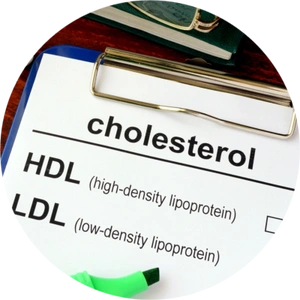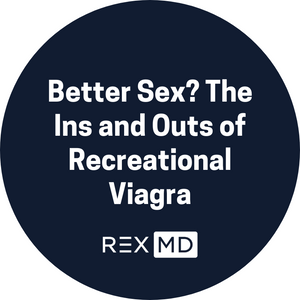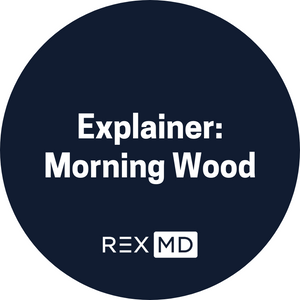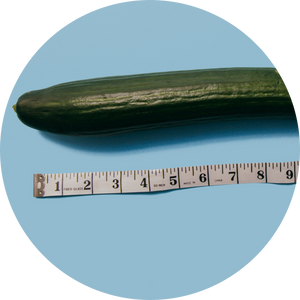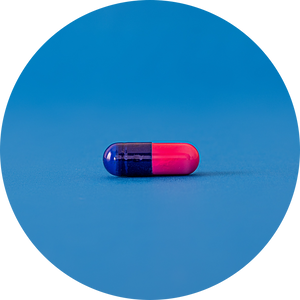Testosterone and cholesterol are two essential components in the human body that play crucial roles in various aspects of health and development.
Testosterone – the primary male sex hormone – is responsible for numerous bodily functions, including the development of reproductive tissues, muscle mass, bone density, and the production of sperm.
Cholesterol is a waxy substance found in the cells of the body. Cholesterol is also vital for the production of hormones like testosterone.
Cholesterol tends to be associated with negative health effects, so before we jump into the relationship between testosterone and cholesterol, it’s important to understand more about it.
Cholesterol has two types: LDL (low-density lipoprotein) and HDL (high-density lipoprotein).
LDL (low-density lipoprotein) and HDL (high-density lipoprotein) are commonly referred to as "bad" and "good" cholesterol.
LDL cholesterol is often called "bad" because high levels of it can lead to the buildup of plaque in the arteries, increasing the risk of heart disease and stroke. This is why LDL cholesterol is often associated with negative health effects.
HDL cholesterol is often referred to as "good" cholesterol because it helps remove LDL cholesterol from the bloodstream and transports it back to the liver, where it is broken down and eliminated from the body. High levels of HDL cholesterol are generally associated with reduced risk of heart disease.
In this article, we’ll discuss the connection between testosterone and cholesterol and how they work together in the male body.
The Relationship Between Testosterone and Cholesterol
Cholesterol plays a crucial role in the production of hormones, including testosterone. Testosterone is a steroid hormone that belongs to a group of hormones called androgens.
Androgens, like testosterone, are made from cholesterol in the body through a series of reactions. These reactions primarily happen in the testes of males.
Without adequate levels of cholesterol, the production of testosterone would not properly occur.
Thus, cholesterol acts as a building block and precursor for the production of testosterone, which is vital for male sexual development and reproductive functions.
The Effects of Testosterone on Cholesterol
The levels of testosterone in the body can have a significant impact on cholesterol levels. High levels of testosterone have been found to lead to a decrease in total cholesterol and LDL. This is because testosterone has been shown to increase the activity of enzymes that help break down cholesterol and improve its clearance from the body.
As a result, high testosterone levels can help maintain healthier lipid profiles by reducing the levels of harmful cholesterol.
Low levels of testosterone can have the opposite effect on cholesterol levels. Studies have shown that low testosterone levels are associated with an increase in total cholesterol and LDL cholesterol.
This is particularly problematic as higher levels of LDL cholesterol are linked to a higher risk of developing cardiovascular diseases. Additionally, low testosterone has been shown to reduce HDL, which plays a vital role in removing LDL cholesterol from the bloodstream.
Maintaining optimal testosterone levels is crucial for promoting healthier cholesterol profiles and reducing the risk of cardiovascular complications associated with unfavorable lipid levels.
The Impact of Cholesterol on Testosterone Production
Cholesterol is important for making testosterone in the body. When there is not enough cholesterol, the production of testosterone can be affected.
Testosterone is produced in certain cells in the testes, and it needs cholesterol as a building block. Without enough cholesterol, the body may not be able to make enough testosterone.
So, keeping cholesterol levels in balance is not only important for heart health but also for making sure the body has enough testosterone for its various functions.
Factors Influencing Testosterone and Cholesterol Levels
Several factors can influence both testosterone and cholesterol levels in the body.
Lifestyle factors such as diet and exercise play a significant role.
A balanced diet that includes essential nutrients like healthy fats, proteins, and vitamins can support the body's production of testosterone and help maintain optimal cholesterol levels.
Regular exercise, particularly resistance and strength training, can also boost testosterone levels. Conversely, a diet high in processed foods, unhealthy fats, and excessive alcohol consumption can lead to imbalances in testosterone and cholesterol.
Certain medical conditions can also affect testosterone and cholesterol levels.
Obesity has been linked to lower testosterone levels and higher cholesterol levels, as excess body fat can disrupt hormone production.
Diabetes – especially in poorly controlled cases – can negatively impact cholesterol metabolism and increase the risk of low testosterone.
Other conditions – such as metabolic syndrome and hypogonadism – can also influence testosterone and cholesterol levels.
Managing these medical conditions through appropriate treatment and lifestyle changes can help restore hormone and lipid balance. Regular monitoring and consultation with healthcare professionals are essential for maintaining optimal testosterone and cholesterol levels.
Recommendations for Maintaining Healthy Testosterone and Cholesterol Levels
Maintaining healthy testosterone and cholesterol levels requires adopting certain lifestyle habits and regular monitoring. Here are the three most important aspects of maintaining healthy testosterone and cholesterol levels:
-
A well-balanced diet rich in nutrients like lean proteins, fruits, vegetables, and whole grains can promote optimal hormone production and cholesterol metabolism. It’s important to limit the intake of saturated and trans fats, processed foods, and sugary beverages, as these can negatively impact both testosterone and cholesterol levels.
-
Regular exercise – including cardio and strength training – can help improve testosterone levels and manage cholesterol levels.
-
Regular monitoring and testing are crucial to evaluate hormone and lipid profiles. Through regular check-ups and blood tests, individuals can track their testosterone and cholesterol levels and identify any potential imbalances or abnormalities. This allows for timely intervention and the implementation of necessary lifestyle changes or medical interventions to maintain healthy hormone and lipid levels.
By adopting a proactive approach towards lifestyle habits and regular monitoring, individuals can strive to optimize both testosterone and cholesterol levels for overall health and well-being.
How Rex MD Can Help
If you want to know more about how to promote healthy testosterone levels, Rex MD has got you covered.
The Rex MD Testosterone Support Supplement is designed to be effective and beneficial in helping men regain confidence and improve their overall well-being.
These ingredients work together to support healthy testosterone levels in men, which can lead to a range of positive effects such as increased energy, improved mood, enhanced muscle strength, and enhanced libido.
Get started today to feel good again, both physically and emotionally.

